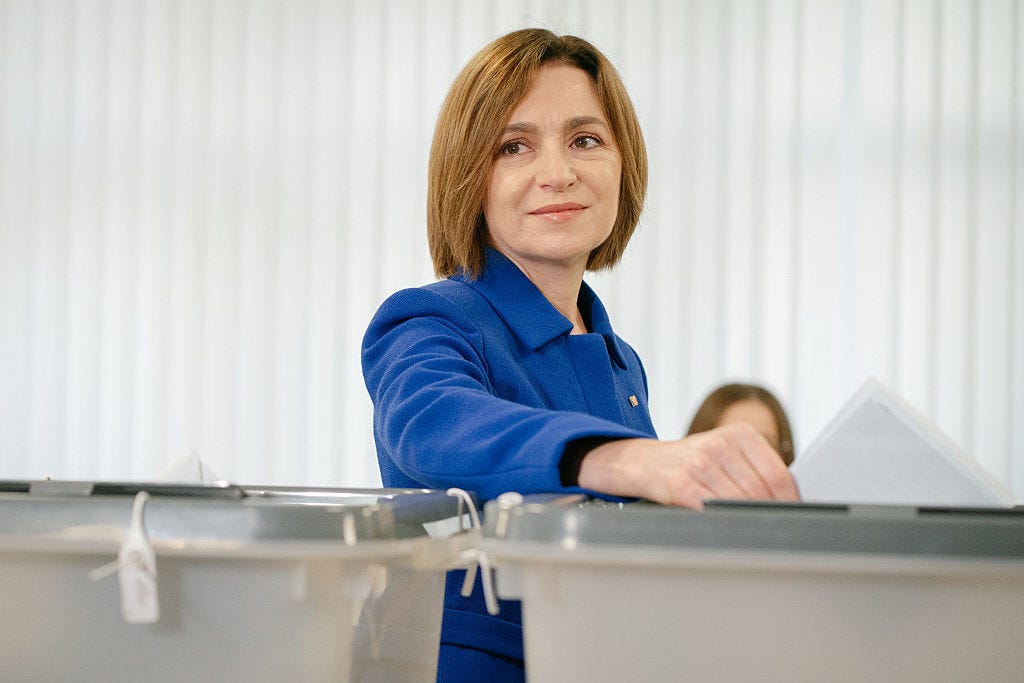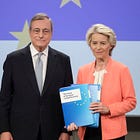Moldova Chooses Europe Over Russia
The recent election result brings hope—but the country needs EU support.

This article is brought to you by American Purpose, the magazine and community founded by Francis Fukuyama in 2020, which is part of the Persuasion family.
“How do we bankrupt Russia?” one character asks in an internet meme circulated about Moldova’s parliamentary election this past Sunday. The answer? To hold more elections in Moldova. Moldovan authorities estimated that the Kremlin spent hundreds of millions of euros to run influence campaigns on Facebook, Telegram, and TikTok, to organize the transport of voters in the diaspora—especially within Russia—to polling stations, and to buy votes directly. Mind you, Moldova’s economy has an annual GDP of some $18 billion, making it akin to a political campaign in the United States spending hundreds of billions, and still failing to win.
The brute force of Russian money was also combined with a new degree of sophistication. Unlike in the old days, when Russian operatives or people working for the disgraced oligarch Ilan Shor would smuggle bags of cash into the country, the more recent methods involved opening personal bank accounts in Russia for thousands of Moldovans ahead of the 2024 EU referendum and presidential election, as well as the use of crypto this year.
Yet it was all for naught. While opinion polls suggested much tighter margins, President Maia Sandu’s Party of Action of Solidarity (PAS) received over 50 percent of the votes—more than twice that of the Russian-backed Patriotic Bloc (24 percent). For all the talk of Moldovans’ disappointment with PAS, the party is keeping its absolute parliamentary majority, a necessary precondition for the wholesale reforms that are needed for Moldova to eventually join the EU.
Moldova might not be the champion of the European idea that the world wanted—but it turns out to be very much the champion that we all needed. Now, it is up to Brussels to help ratify the years of progress, culminating in PAS’s victory in the recent parliamentary election. This is a moment to celebrate—but also a moment for PAS and its counterparts in the EU to consolidate the victory and pry Moldova out of Russia’s hands once and for all.
No one can do it for the Europeans. Following Sandu’s victory, they must seize the opportunity and bring Moldova into the EU by the end of the current parliamentary term, alongside Albania and Montenegro, which seek to conclude the technical part of accession talks by 2027. Moldova is hoping to follow the same schedule, though its understandable domestic challenges in areas such as the rule of law, the judiciary, and corruption are further compounded by the unclear status of the breakaway region of Transnistria and the presence of a Russian “peacekeeping” force.
There are grounds for optimism beyond just the auspicious politics of the moment. Moldova is tiny. It is a country of 2.4 million people—less than the Austrian capital of Vienna and its suburbs—around one million of whom are already EU citizens by virtue of their Romanian nationality. Yes, it is poor, but EU money goes a long way. If the Kremlin thought it a wise investment to spend hundreds of millions trying unsuccessfully to sway Moldovan elections, surely the EU with its sheer economic size could afford to spend 5 percent or more of Moldova’s GDP indefinitely on public investment that will, under the right conditions, accelerate economic growth and bring Moldova closer to the EU’s average.
Previous waves of EU enlargement provide a warning against simply injecting EU funds into corrupt and politically fraught environments. Yet this is not a time to be pennywise but poundfoolish. The experience of EU funds spent well, from places such as Poland or the Baltic States, should guide the rollout of EU programs in Moldova.
The question of the legal status of Transnistria, and potentially of Gagauzia, may complicate the picture. Yet neither case should be seen by the EU as an insurmountable problem, in part due to their miniscule scale. In the latter case, the issue is not separatism as such but rather the ties that Russia developed with representatives of the local Gagauz minority, a Turkic ethnic group, which is majority Orthodox. Briefly independent in the 1990s, Gagauzia has little in terms of urban centers or even its own economy. Gagauzia’s main export commodity, wine, has benefited from the extraordinary transformation of the Moldovan wine industry writ large, especially the growth in quality standards and the reorientation toward EU markets.
Much of the same argument, with the caveat of a larger scale, applies to Transnistria. The economic viability of steel and cement plants in Rîbnița, the largest businesses in the region, long relied on the supply of cheap energy from Russia. Once severed, thanks to the war in Ukraine, it is hard to see how the self-proclaimed separatist “republic” can be sustained economically without the help of Chișinău—and the EU.
Ukraine’s sealing of its border with Transnistria during the war has effectively choked off smuggling and other criminal activity that helped prop up the regime. Russian “peacemakers,” meanwhile, are largely an imaginary construct. Although there are dozens of Russian officers, not rotated in years, the bulk of the military force consists of local holders of Russian passports who signed up in the hope of receiving Russian military salaries. Again, unless the war turns into a catastrophe for Ukraine, it is hard to see how Transnistria can be sustained in its current form as a Russia-backed separatist mafia state. Transnistrian elites, by most accounts, see the writing on the wall as they have been maintaining lively communications channels with Chișinău. Following the most recent parliamentary election, and assuming that the Ukrainian state will continue to serve as a bulwark against Russian imperialism, it would be only sensible for the Transnistrians—and the Gagauzians—to start planning a post-Russian future in a European Moldova.
How exactly the settlement will look on the eve of Moldova’s EU accession and in its aftermath is not clear. But in the grand scheme of things, these are trivial complications—especially when compared against the magnitude of the already fought and won political battles in which Moldova’s David successfully confronted Russia’s Goliath.
Dalibor Rohac is a senior fellow at the American Enterprise Institute in Washington, D.C.
Follow Persuasion on X, LinkedIn, and YouTube to keep up with our latest articles, podcasts, and events, as well as updates from excellent writers across our network.
And, to receive pieces like this in your inbox and support our work, subscribe below:






I have appreciated Persuasion's ongoing attention to the situation in Moldova. Thanks.
Basically, the EU Commission needs to provide support to the current and the future citizens